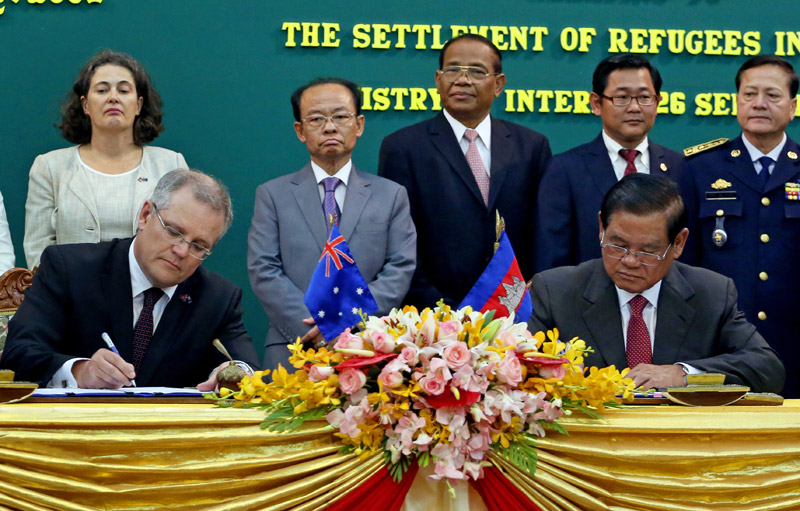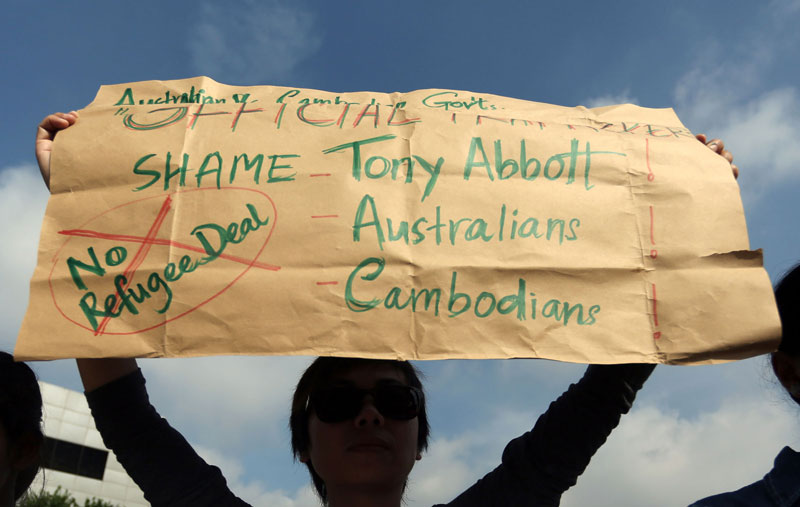Interior Minister Sar Kheng and Australia’s immigration minister, Scott Morrison, signed a memorandum of understanding in Phnom Penh on Friday sealing a deal to have refugees who sought asylum in Australia sent to Cambodia from the South Pacific island of Nauru, where they are currently being held.
Shortly before 3:30 p.m., the two arrived at an extravagantly decorated room at the Ministry of Interior where, without saying a word, they signed the documents that will determine the fate of perhaps hundreds of refugees.

Breaking the silence was the smashing of champagne glasses as a waiter tripped. Mr. Kheng and Mr. Morrison declined to answer a barrage of questions from members of the media as they quaffed champagne and congratulated each other before leaving the room. Mr. Morrison was hurried into a waiting car and driven away.
A joint statement released after the signing says: “The number and timing of Refugees settlement will be determined by Cambodia,” adding that the two countries have agreed to “an initial trial arrangement with a small group of refuges which will be followed by further resettlement in accordance with Cambodia’s capacity.”
It also says that both governments will work together—with the cooperation of the U.N. High Commissioner for Refugees (UNHCR)—“to ensure the smooth and successful implementation” of the transfer deal.
But Vivian Tan, the UNHCR’s regional press officer in Bangkok, countered that claim by email, saying: “Our position remains unchanged—we do not have a role in this bilateral agreement.”
A statement issued by the UNHCR on Friday said the organization was “deeply concerned at the precedent set” by the agreement.
“Refugees are persons who are fleeing persecution or the life-threatening effects of armed conflict. They are entitled to better treatment than being shipped from one country to the next,” it quotes the U.N. High Commissioner for Refugees Antonio Guterres as saying.
According to the joint statement, Mr. Morrison said that refugees currently being held off of Australia’s shores “will now have the opportunity and support to re-establish their lives free from prosecution.”
He goes on to defend Cambodia —which in 2009 forced 20 Uighur asylum seekers back to China at gunpoint—as a suitable destination for refugees.
“As a party to the Refugees Convention, Cambodia, while making countless efforts to develop the country after civil war, is demonstrating its ability and willingness to contribute positively to this humanitarian issue.” the statement quotes Mr. Morrison as saying.
Mr. Morrison told the Australian Broadcasting Corporation on Friday that Australia plans to send a further $40 million in aid to Cambodia over the next four years as part of the deal. But he denied that it would be used to facilitate the transfers and said instead it would be used on development projects.

In Phnom Penh on Friday morning, about 50 protesters from the Independent Monks Network of Social Justice, Federation of Cambodian Intellectuals and Students and residents of the Boeng Kak and Borei Keila communities protested on the heavily barricaded road in front of the Australian Embassy.
They held up signs that called for the government to honor its responsibilities at home before signing deals to take in refugees and said Cambodia is “too poor” to take in Australia’s refugees.
“How far has Cambodia developed?” said monk Sim Sovandy. “It hasn’t yet built a peaceful relationship with its own citizens, who have suffered from land grabbing and human rights violations.”
CNRP leader Sam Rainsy said by telephone that he deplored the “total lack of transparency” in the drafting of the deal, which has been under negotiation since February.
“We don’t know any plan, we have no guarantee, because we are used to seeing the diversion of resources not going to its intended purpose,” Mr. Rainsy said.
“Cambodia is not a place to resettle refugees, because the local people in this country cannot lead decent lives,” he said. “They are deprived of fundamental rights and living conditions, so how could we accommodate people from other parts of the world?”
The statement released at Friday’s signing ceremony says that, as part of the agreement, “Australia will bear the direct costs of the arrangement, including initial support for refugees, and relevant capacity building for Cambodia to ensure it has the appropriate resources to receive and integrate the refugees successfully.”
Mr. Morrison and Cambodia’s Foreign Affairs Minister Hor Namhong have also said that any transfers of refugees would be strictly on a voluntary basis.
But the deal, which was made without the input of the UNHCR, has been widely condemned by civil society groups and opposition politicians in both countries, who say that it breaches the 1951 Refugee Convention, and that Cambodia is ill-equipped to ensure the well-being of refugees.
Elaine Pearson, the Australia director of Human Rights Watch, said the agreement sends the message that developed countries can simply offload their international obligations by offering funding and assistance to developing countries.
“While Cambodia has signed the Refugee Convention, it has a terrible record for protecting refugees and is mired in serious human rights abuses,” Ms. Pearson said.
“Cambodia has not demonstrated the willingness or ability to provide refugees adequate protection. Australia has found a new excuse to palm off the refugee problem rather than genuinely finding a regional solution that will involve Australia doing its fair share.”




